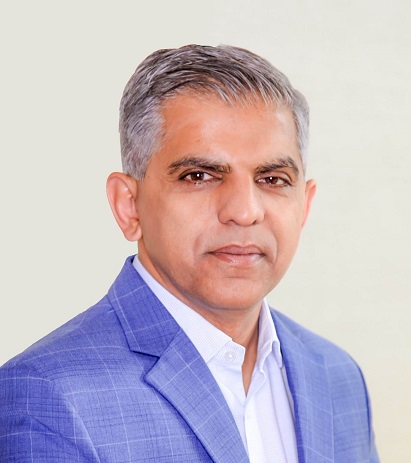
Shattering the Traditional Barriers | Conversations@Jazz
July 11, 2019
Misguided Fear of the Digital World | Conversations@Jazz
July 17, 2019Financial technology priorities for Pakistan
Nadeem Shaikh is a globally recognized voice in the Digital Financial Services industry. Having lived and worked globally, and grown a range of businesses, he has a unique insight as a business leader, innovator, venture capitalist, philanthropist and entrepreneur. Over the past decade, he has been at the heart of the “Fintech” revolution.
Recognizing that the fundamental needs of consumers were changing and no longer subject to predefined industry silos, Nadeem began exploring “Financial Wellness” by raising one of the first venture capital funds dedicated to this space in 2016.
Today, he is focused on building businesses that provide financial wellness to millions of consumer and small businesses. Nadeem is currently heading the digital financial services business at Veon, one of the largest emerging market telecommunications firm.
Nadeem is also the co-founder and Chairman of The Future Farm, a global firm dedicated to providing people with a new way to design work and life in today’s fast paced world.
Over the last 25 years, he has held many senior executive roles in the financial services industry globally and was also the co-founder and CEO of Anthemis – one of the first early stage venture capital and advisory firms dedicated to Fintech.
Nadeem has held numerous non-executive positions and gives his time to impact driven businesses including Access Afya, which runs clinics and a healthy schools programme for children in Nairobi and Prospero World, a charity which aims to enrich society through the arts and CARE Pakistan (UK) which provides free education to Pakistani children.
Nadeem is a frequent global speaker on topics ranging from innovation culture, developing ecosystems, financial wellness, diversity and building agile companies.
He lives in London with his family. In his spare time, Nadeem practices yoga, paints and is a qualified day skipper for sailing.
The fin-tech story of Pakistan is not just one of the 75% unbanked; it is about the incredible uptake of millions who have readily adopted digital financial tools. Consider that despite entering late into the fin-tech market with JazzCash, we have the lead in terms of the number of transactions. Over 14 million people who use the money transfer facility without the need for a bank account collectively hold 14 billion rupees, which is a 60% increase since last year. There are 80,000 brands that are our partners across all industries.
However, we are missing the magic of digital transformation if we only focus on mobile wallets alone. Whereas m-wallets are good financial tools, for ultimate financial wellness the industry will need to create more product and services and help in their adoption as well. Financial wellness does not just mean access to payments and money transfer but also savings, health, insurance and other life style needs.
Whereas I don’t wish to expand too much on these trends in fin-tech, I do hope we know that a fully fin-tech-adopted Pakistan means significantly lower banking costs, robust innovation and greater access for all. As we let this fact sink in that only 18% of Pakistanis have used digital financial services, we must roadmap the extraordinary market that remains in need.
If Pakistan does not take the effective steps in opening and expanding this sector over the next five years, our demographic dividend will become a GDP liability. There are some key enablers to consider as we build the digitalization industry of Pakistan’s financial services sector over the next five years:
Financial wellness for all, not just the financially literate
In designing fin-tech architecture it is important to understand that this is not just the domain of technologists and deep domain experts, but of those who understand community mobilization. Money makes almost everyone feel uncomfortable and largely approaches towards money woes have an avoidance approach. Even when techies make products well, they define it in complex financial jargon terms that the common person finds foreign.
Fintech is thankfully disrupting old incumbents, and doing so rather dramatically. Many large banks refuse to leverage customer loyalty and hardly innovate on competitive offerings. When they jump into the fin-tech field, many aim only at a tiny “tech-savvy” audience, and as a result, they miss out the most vulnerable or excluded members of society.
The customer will only adopt a product if they feel comfortable about money, if they can anticipate change, if they can react to financial shocks such as disease and death and invest for the future.
Focus on Gen Z over Gen X
The needs of the consumer are changing. The future belongs to a generation that does not trust big financial brands that are largely responsible for the financial crisis and exorbitant markup rates that led to their parent’s debt crisis.
Young people want a democratized solution that gives them both control and choice at their fingertips. They also want that choice to be free, or almost nominal compared to traditional bank charges. Most importantly they want there to be consistent access at any time. No one under 20 ever buys anything simply because of a brand name, they compare, then choose purely on their comfort level.
Enable women to outsize financial inclusion impact
We know that empowering women through access to financial services leads to a spike in spending on both healthcare and education, but with mobile financial independence, the contribution to GDP is outsized because women in conservative societies can transcend mobility challenges. Several women with mobile wallets and access to microloans and saving schemes via their phone are venturing into the e-commerce space and gig economy. Due to the rise of the penetration of the Internet and 3G/4G services, since last year the e-commerce industry doubled to 40 billion rupees. As a result, the services sector increased its GDP contribution from 52% to 60%.
As we stand now, only 1% of Pakistan’s entrepreneurs are women, and with fin-tech, the talents and innovation can grow and scale not just women’s lives but help shrink our fiscal gap. The World Economic Forum (WEF) reports that Pakistan is the second-worst country in the world in terms of gender parity, ranking 148 out of 149 countries in the ‘Global Gender Gap Index 2018’ report.
Having said that when we look at JazzCash, more women use the service than the percentage that comparatively uses traditional banking channels. This is encouraging because it displays a clear trend of comfort and preference that women have despite the terribly low phone penetration rates for this demographic.
The time is now
In the next five years, while the bulk of our population will head towards their core affluent years, we need to advocate for financial independence so that live richer and fuller lives.
Presently the economic health of our working class is suffering. Regularly Pakistanis run out of money before their paycheck. Their savings are often less than a month of their salary and rely on borrowing from family to pay regular on-going expenses. When they do borrow from traditional financial institutions the interest rates are exorbitant and prohibitive enough to send them into a debt spin.
One of the tragedies of Pakistan is that the digitally excluded are the ones paying the highest prices for financial inclusion. The barrier is both language and complicated user interfaces. We think only the poor suffer, but so do the educated professionals who also find finance intimidating and accounting jargon impenetrable to comprehend.
This leads to bad financial decision-making and chronic unhappiness in the jobs they need to stick to in order to pay off the banking commitment mistakes they made.
Government-backed digital reform to curb corruption
What you can digitize, you can track and monitor. This is why digital financial services is an agenda close to the present government’s political mandate as they seek to bring radical transparency to our institutions.
With e-government and many fee payments increasingly adopting mobile wallet payments, inevitably the leakages in governments especially in the G2B sector can be curbed with a range of fin-tech interventions.
Presently the State Bank is open to creating a financial wellness culture across Pakistan in tandem with the private sector. Digital leadership cannot be possible without collaboration. The results we can deliver with innovation and regulatory collaboration can produce scale, stability and open Pakistan to global investors who see us as a promise, but hesitate because of the fact that market maturity and transparency lag behind.
Our solutions need to be quintessentially Pakistani, in local languages reflecting a local value system and several choices for our young women and men. The unique differential that Jazz offers in the fin-tech industry is that it does all this and more in its upcoming versions.
More: www. @JazzCash | DigitalPakistan.pk






